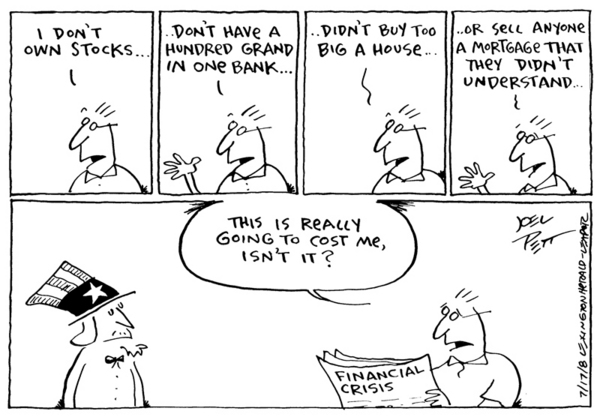I promise I won’t take up so much space on here after the dust settles, but I’m having a hard time getting my mind around the enormity of what’s happening with Fannie and Freddie and what it means, so I figure the best thing I can do is share what I know with others……
I came across this article in the Wall Street Journal which lays out a good “story” of what has transpired. I’m going to copy excerpts of it, but I’d urge you to read the whole thing…….
By DEBORAH SOLOMON, SUDEEP REDDY and SUSANNE CRAIG
September 8, 2008
WASHINGTON — In the end, Fannie Mae and Freddie Mac had no choice.
Summoned to separate meetings on Sept. 5 with Treasury Secretary Henry Paulson and other top officials, the two mortgage giants were told they could either agree to a government takeover or one would be foisted upon them.
“We have the grounds to do this on an involuntary basis, and we will go that course if needed,” Mr. Paulson told senior executives at the two companies, who had little idea such a move was coming, according to three people familiar with the meetings.
There was no dramatic trigger, nor was there fear of imminent collapse. Instead, the sweeping government intervention stemmed from a growing realization by Treasury and Federal Reserve officials that the two companies couldn’t survive in their present forms, and that any collapse would be devastating to the economy.
The decision was hashed out over weeks of meetings…….
In the end, Mr. Paulson, Federal Reserve Chairman Ben Bernanke and James Lockhart, head of the companies’ regulator, the Federal Housing Finance Agency, concluded that the two companies had lost the confidence of the markets and couldn’t survive as currently structured. …..
Inside Treasury, the hope was that merely receiving authority to backstop the two companies would comfort markets enough that they could raise capital on their own. ……..
Two things would soon force Treasury’s hand. Uncertainty about Treasury’s plans and how any intervention would affect shareholders caused shares of Fannie and Freddie to fall sharply, making it all but impossible for them to raise equity. At the same Read more




 That image looks nice, but I’m pretty sure it’s a mistake. We’re growing, always, but I don’t think we’re growing quite this fast.
That image looks nice, but I’m pretty sure it’s a mistake. We’re growing, always, but I don’t think we’re growing quite this fast.